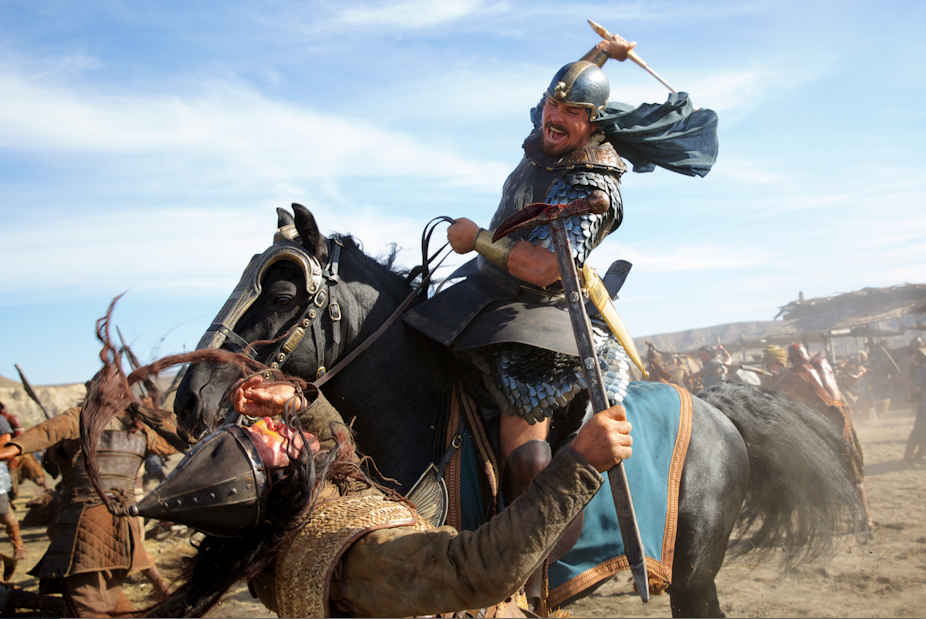Ridley Scott’s 3D biblical epic Exodus: Gods and Kings (2014), an interpretation of the exodus of Israelite slaves from Egypt by Moses, sparked controversy last month when it was banned in Egypt and Morocco. Egyptian culture minister Gaber Asfour said: “It gives a Zionist view of history and contains historical inaccuracies and that’s why we have decided to ban it.”
Portrayals of history are, of course, contested and contestable. History involves interpretation in a complex relation to fact, bias and worldview.
Portrayals of ancient history are even more fraught as they rely on ancient stories imbued with particular aims and worldviews. The genre of ancient storytelling is different from modern history. It is concerned with the power and meaning of human experience and their implications for social and religious life, rather than focusing only on factual accuracies.
This is exemplified in the Bible where similar stories are recounted reflecting different perspectives and meanings (e.g. the creation stories in Genesis).
Modern musing on ancient ideas

The way we tell stories in the West has similarities to ancient storytelling. Hollywood makes films “based on a true story” that often have tenuous or heavily redacted relations to the facts. These “true stories” can be unjust and misleading. But if created with the right balance of fact and interpretation, these films can be a way to reflect more deeply about the subject under examination and about our modern life.
The modern filmmaker, then, is interpreting a story, which is itself an interpretation of some kind of experience. I would argue that it is the theological, cultural and anthropological meanings of ancient story that need to be understood if a filmmaker wants to engage most thoroughly and authentically with the biblical text.
Accurate records of the past are important, but there is more going on in the genre of story than just recounting the past.
In the case of Exodus: Gods and Kings, Ridley Scott varies the story from the biblical account. In some ways, he keeps to its essence by showing God acting in history and building a friendship with Moses. In other ways, Scott presents modern preoccupations that take the viewer away from the biblical text in dubious ways.
Take Moses who Scott makes a warrior general (à la Gladiator), which is questionable historically and textually. However, Scott intelligently subverts this construction when God rejects Moses’ violent efforts to free the Israelites.
The point is: it is God’s action that ultimately saves the Israelite people. Connected to this, the character of Moses receives an interesting treatment as he learns to trust in God and less in his own violence and atheism, with some parallels to the biblical text but with a modern twist.
A Hollywood love story
The title of Scott’s film suggests a battle between gods and kings, but the film tends to focus on the Moses-Pharaoh or Moses-Zipporah relationships. Biblical themes are present, yet the psychologising and sentimentalising of the characters and their relationships presents a modern preoccupation.
Moses’ romantic relationship to his wife is a focus of the film, but this relationship is rarely mentioned in the Bible, except in relation to family or religious matters.
The Hollywood construction of identity and relationships presents a continued trend that misunderstands the ancient character and lifestyle, and projects a modern one onto them.

These constructions tend to detract from the social and religious conflict between the Israelite and Egyptian peoples and gods, with the Israelites playing a minor role in the film.
In contrast to the film’s exploration of relationships, it is the Pharaoh’s fear of the Israelites and his escalating efforts to violently oppress them that sets off the Exodus sequence in the Bible. The portrayal of Pharaoh in the film includes this aspect but introduces other elements, leading to an inconsistent treatment.
God’s responsibility
One of the more interesting aspects of the film is the portrayal of God in the guise of a small child, who is self-assured but also petulant and jealous for his people. This portrayal of God focuses on the dialogue and friendship between God and Moses, which is also an integral part of the biblical text.
In one unusual scene, though, Moses pleads with the child-God in relation to the suffering of the Egyptians caused by the plagues. God angrily responds:
I want to see them on their knees begging for it to stop.
It is a surprising moment that shows the childishness of violence. For the biblical Exodus, however, God’s action is not vengeful but liberating: a necessary action to free oppressed people from a violent and power-hungry leader claiming divinity. The essential experience of the biblical Exodus is of a people being freed in a completely unexpected way from unjust domination by one of the great empires.

Nevertheless, this violent pronouncement confronts the problem of violence and its connection to God. Is God involved in violence? How do humans contain their own violence?
The violence of the Exodus is disconcerting to a modern viewer, but the ancients would not blink an eye. The central questions for them were: who is in control and how can we bring the violence under control?
The Bible makes clear that the Lord God – the only God – is in control, even of violent plagues. In being in control, God does not act randomly or for his own benefit or to satisfy his own desires (in the way the Greek gods do), but seeks out an insignificant, oppressed people to help them for their own good.
The biblical text attributes responsibility to God only in so far as the Pharaoh obstinately oppresses the Israelite people. But this should not excuse the violence, which the biblical tradition itself critiques with the prophets and Jesus.
The film retains the essential experience of the violent and liberating exodus of the Hebrews from Egypt, though with modern constructions and tangents that do not work or convince at times.

